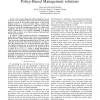Free Online Productivity Tools
i2Speak
i2Symbol
i2OCR
iTex2Img
iWeb2Print
iWeb2Shot
i2Type
iPdf2Split
iPdf2Merge
i2Bopomofo
i2Arabic
i2Style
i2Image
i2PDF
iLatex2Rtf
Sci2ools
132
click to vote
IM
2007
2007
Business-Driven Optimization of Policy-Based Management solutions
— We consider whether the off-line compilation of a set of Service Level Agreements (SLAs) into low-level management policies can lead to the runtime maximization of the overall business profit for a service provider. Using a simple web application hosting SLA template for a utility service provider, we derive low-level QoS management policies and validate their consistency. We show how the default first come first served (FCFS) mechanism for the runtime scheduling of triggered policies fails to deliver an all times maximum business profit for the service provider. To achieve a better business profit, first a penalty/reward model that is derived from the SLA Service Level Objectives (SLOs) is used to assign runtime utility tags to triggered policies. Then three policy scheduling algorithms, which are based on the prediction of the future state of the running SLAs, are used to drive the runtime actions of the Policy Decision Point (PDP). The prediction function per see involved ...
| Added | 29 Oct 2010 |
| Updated | 29 Oct 2010 |
| Type | Conference |
| Year | 2007 |
| Where | IM |
| Authors | Issam Aib, Raouf Boutaba |
Comments (0)

